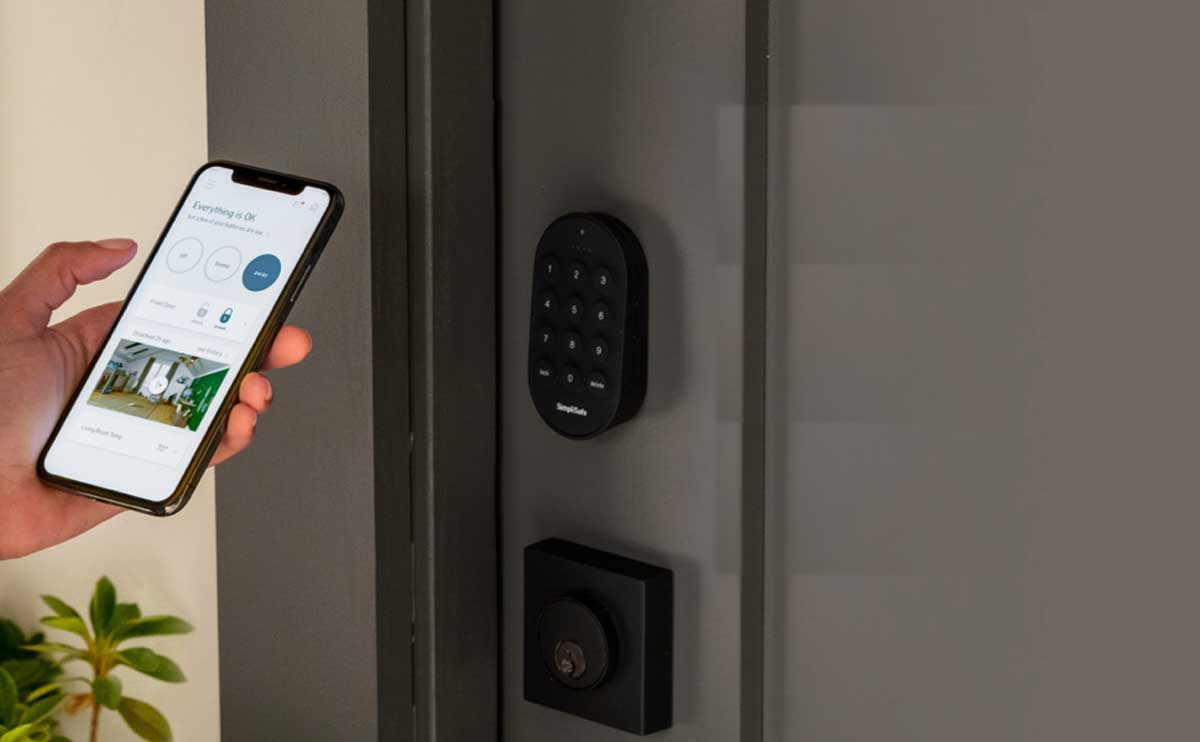What Causes False Alarms on Home Security Systems?
When you purchase through links on our site, we may earn a commission. Here’s how it works.
Why does my alarm keep going off? A false alarm occurs when your security system alarm goes off without a proper reason. These alarms can also happen with security cameras and motion sensors that send alerts through an app or email. Anytime you receive a warning, and there’s no valid reason for it, it’s a false alarm.
Unfortunately, if you can’t stop a false alarm, your security system may send emergency responders to your home. That situation can be a waste of time for the responders and costly and embarrassing for you.
5 Things That Can Cause A False Alarm
Here’s a list of five common causes of false alarms.
House Alarm Sensor Problems
These are probably the most common cause of a home security false alarm. Examples include a door or window sensor that is either not attached correctly or is running low on battery power. Especially vulnerable to these types of false alarms are DIY-installed motion detectors that are attached to a wall with peel-and-stick adhesives.
What can cause a motion sensor to false alarm? If the motion sensor is not attached to the wall correctly and crashes to the ground, it may incorrectly detect a motion event. You may be able to adjust your motion sensor’s sensitivity settings as well, to prevent it from detecting acceptable motion (such as a fly crawling across the device).
Unlocked Doors and Windows
This is particularly a problem in older homes – where doors or windows may not latch completely closed. If a door or window inadvertently swings open, the sensor may indicate a window or door opening by a potential intruder when in fact the culprit was just a gust of wind.
Low Battery
Low batteries in sensors may also cause them to trigger a false alarm. This happened to us with our SimpliSafe alarm system because we had not correctly mounted our fire and smoke detectors. As a result, the battery drained more quickly than normal and triggered false alarms.
Many modern systems will now have low battery alerts so you can change your sensor’s battery before it enters a false alarm state. A power outage may also cause your batteries to drain more quickly, especially if your system offers battery-backup.
Faulty Equipment
Home security equipment, like any technological innovation, is subject to faultiness. If you think you received a faulty sensor that is repeatedly triggering false alarms, call your home alarm company and ask for a replacement.
Know Your Code
If you are on a professionally monitored home security system, you’ll need to remember your disarm code so you can disarm your system in the event of a false alarm before the authorities are notified.
5 Ways To Prevent A Security Alarm Going Off For No Reason
Did your house alarm go off for no reason? Here are five more things you can do to prevent false alarms:
1. Motion sensors: Make sure your motion sensors aren’t too sensitive to your environment. For instance, if you have pets, you’ll want sensors that won’t trigger every time your pet walks by. See the best security systems for pet owners to learn more.
2. Doors and windows: Locking and securing doors and windows ensures the sensors in these areas don’t trigger accidentally. Always double-check before setting your alarm.
3. Batteries: Most security companies’ sensors’ have “low battery” alerts, so they shouldn’t cause a false alarm, but like with most things in life, these don’t always work as intended. If you can’t rule out the cause of your false alarm, try changing the batteries in your sensors.
4. Maintain your equipment: Check your home security equipment regularly so you don’t end up with faulty equipment setting off a false alarm.
5. Know your code: Practice deactivating the alarm and make sure everyone who needs one has a code and knows how to use it. In case the monitoring station is alerted and calls, all emergency contacts should also know your home security account’s safe word (the word required by the monitoring station to act on your behalf in regard to an alert notification).
False Alarm Fees
Lots of cities and towns may charge fees for false alarms. These fees can range from $25 to several hundred dollars, depending on where you live. Most places won’t charge you for your first offense, or they’ll even give you two to three false alarms a year before charging you. Check for false alarm ordinances in your area to learn the local specifics.
How Should I Handle A False Alarm?
Depending on the system you have, there are different ways to stop a false alarm. Our experts provide details below by security company. Keep in mind that if you’re on a professionally monitored system and do not respond quickly to de-escalate an alert, the authorities will be contacted to respond.
Vivint

When an alarm goes off, Vivint will try to reach you through the touch screen panel first and then attempt to call you at your emergency contact number before dispatching the authorities. You’ll need to verify your verbal password with the monitoring specialist to confirm a false alarm.
SimpliSafe

With SimpliSafe, you have 30 seconds to use your code to turn off a false alarm before they contact you. After that time, they call your primary contact. You’ll need to give your safeword to confirm that it’s a false alarm.
What If I Discover It’s Not A False Alarm After All?
Your “safe word” is what the monitoring station uses to dispatch authorities. If you find out there is, in fact, an intruder, or worse, you are under duress, you can simply give the wrong safe word, and the monitoring station should dispatch the authorities and act like everything’s normal (in case you’re on speaker phone, for example). If you want to make sure this is the case, we recommend contacting your home alarm provider.
Ring

If your Ring Alarm triggers, the monitoring center will call your primary emergency contact, followed by your secondary emergency contact, if necessary. You’ll need to provide them with your verbal password to deactivate the false alarm.
One of the more common problems with a Ring Alarm is motion sensor false alarms. They offer lots of troubleshooting advice on their website and give you a seven-day practice mode when you get your alarm to learn the ins and outs, practice using the system, and tweak your sensors.
Learn more about central monitoring stations, who’s behind them, and how they work.
Kidde

Kidde makes fire safety products, including smoke and carbon monoxide detectors. Most of their products have The Hush feature that allows the user to deactivate the alarm for eight minutes. You can use that time to clear the smoke. If, after eight minutes, the smoke is still there, the alarm will sound again. You can use this feature as many times as you need until you can clear the air.
Blink

Blink is an Amazon company that makes a variety of indoor and outdoor cameras. How can you avoid home security camera false alarms? If you’re having trouble with false alerts, they have a few options. In addition to troubleshooting information on their website, they also have an online community where you can post your questions and concerns about your specific cameras. Other users will help guide you to a solution.
ADT

ADT has a 30-second delay built into its response system. You can increase this time to 45 seconds, or you can remove it. If you know you’ve triggered a false alarm, ADT asks that you call the central station to prevent an unnecessary response. If you don’t, they’ll still attempt to reach you to get your password before they dispatch help.
Can My Security Provider Reach Me?
With all home security systems, you should make sure all contact information is accurate and up to date so the company can reach you when they need to confirm if an alarm is valid.
Reducing False Alarms To Give Police A Break
This two-minute video from CBS46 in Atlanta talks about how the police department in Sandy Springs, Georgia, reduced false alarm responses and how some residents have mixed emotions about this change.
Secure Your Home With Or Without An Alarm
False alarms can make you doubt your home security system and can be annoying. Luckily, there’s more than one way to secure your home. Check out our article on how to secure your home without an alarm to make sure your family always feels secure, even if your alarm is giving you false alerts.
Have you experienced a false alarm? With which home security provider? Let us know in the comments!



